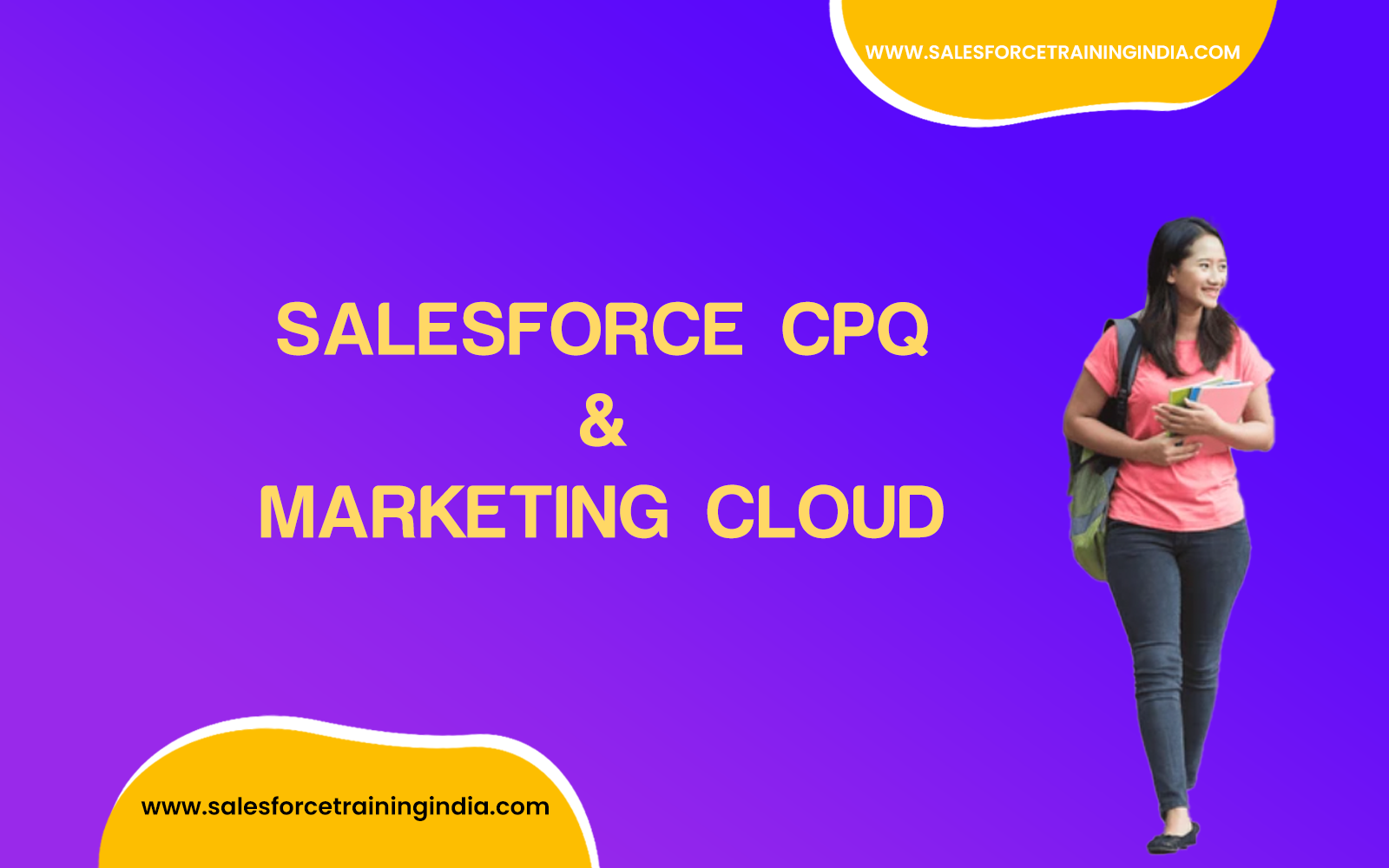Salesforce CPQ (Configure, Price, Quote) and Marketing Cloud are two specialized tools in the Salesforce platform, each designed to handle different aspects of the business process.
Salesforce CPQ
Salesforce CPQ (Configure, Price, Quote) is a sales tool within Salesforce that helps companies configure products, price them accurately, and generate quotes efficiently. It automates the quoting process, ensuring sales teams can provide customers with accurate and customized quotes quickly. This tool integrates seamlessly with Salesforce CRM, allowing sales representatives to access customer information, product details, and pricing data in one place. Key features of Salesforce CPQ include product configuration, pricing management, discount management, and quote generation. It also supports complex pricing models, bundling of products, and approval workflows to ensure that quotes are accurate and comply with company policies.
Features of Salesforce CPQ
Salesforce CPQ offers a variety of features designed to streamline the sales process. These include:
- Product Configuration: Helps sales reps configure complex products with guided selling and validation rules to ensure accurate configurations.
- Pricing Management: Automates pricing calculations, including volume discounts, tiered pricing, and contract pricing.
- Quote Generation: Enables the creation of professional, branded quotes and proposals that can be easily customized and shared with customers.
- Discount Management: Allows for flexible discounting while maintaining control with approval workflows and margin protection.
- Approval Workflows: Ensures quotes meet company policies through customizable approval processes.
- Subscription Billing: Manages recurring billing for subscription-based products and services.
- Contract Management: Streamlines the process of creating and managing contracts, ensuring compliance and accuracy.
Salesforce Marketing Cloud
Salesforce Marketing Cloud is a digital marketing platform that allows businesses to plan, personalize, and optimize customer interactions across multiple channels, including email, social media, mobile, and web. It is designed to help marketers deliver personalized customer journeys, create engaging content, and measure the effectiveness of their campaigns. Marketing Cloud provides tools for customer data integration, segmentation, and analytics, enabling marketers to understand their audience and tailor their messages accordingly. It also offers automation capabilities to streamline marketing processes and improve efficiency.
Features of Salesforce Marketing Cloud
Salesforce Marketing Cloud is packed with features that empower marketers to create impactful campaigns and drive customer engagement. These features include:
- Email Studio: Allows marketers to create, personalize, and optimize email campaigns to reach and engage customers effectively.
- Journey Builder: Enables the creation of personalized customer journeys across multiple channels, ensuring a consistent and seamless experience.
- Audience Studio: Provides advanced segmentation and targeting capabilities to reach the right audience with the right message.
- Social Studio: Manages social media marketing efforts, including publishing, engagement, and analytics, across multiple social platforms.
- Mobile Studio: Helps marketers connect with customers through SMS, push notifications, and group messaging.
- Advertising Studio: Integrates advertising efforts with marketing campaigns to reach customers on social media and other digital channels.
- Datorama: Offers advanced analytics and reporting tools to measure campaign performance and gain actionable insights.
- Interaction Studio: Provides real-time personalization and interaction management to deliver relevant content based on customer behavior.
Frequently Asked Questions
1. What is the difference between Salesforce CRM and Salesforce CPQ?
Salesforce CRM is a comprehensive platform for managing customer relationships, encompassing tools for sales, service, marketing, and analytics. It focuses on tracking customer interactions, managing leads and opportunities, automating workflows, and generating reports. Salesforce CPQ (Configure, Price, Quote), on the other hand, is a specialized tool within the Sales Cloud that helps sales teams quickly generate accurate quotes for complex product configurations. CPQ automates pricing, discounting, and approval processes, streamlining the sales cycle and improving efficiency. While CRM covers a broad range of customer relationship management functions, CPQ specifically addresses the complexities of product configuration and quoting.
2. Who uses CPQ in Salesforce?
Salesforce CPQ is primarily used by sales teams to streamline the process of configuring products, pricing them accurately, and generating quotes quickly. It is also used by sales operations and finance teams to ensure that quotes adhere to pricing rules and discounting policies, and to manage approval workflows. Additionally, channel partners and resellers may use CPQ to provide consistent and accurate quotes to customers.
3. Is Salesforce CPQ worth it?
Yes, Salesforce CPQ is worth it for organizations with complex product configurations and pricing structures. It significantly improves the efficiency and accuracy of the quoting process, reducing the time sales teams spend on generating quotes and increasing the speed of closing deals. CPQ ensures consistency in pricing and discounting, reduces errors, and enhances the overall customer experience. The investment in CPQ can lead to increased sales productivity, higher revenue, and improved customer satisfaction.
4. Does Salesforce CPQ require coding?
Salesforce CPQ does not require extensive coding for its basic setup and configuration. Most of the functionalities, such as product configuration, pricing rules, and approval workflows, can be managed using declarative tools and the point-and-click interface. However, for more complex customizations and integrations, knowledge of Apex (Salesforce’s programming language) and Visualforce may be necessary. Overall, many tasks can be accomplished without coding, but advanced customization might require technical skills.
5. What is the purpose of CPQ in Salesforce?
The primary purpose of CPQ (Configure, Price, Quote) in Salesforce is to automate and streamline the process of configuring products, setting accurate prices, and generating professional quotes. CPQ helps sales teams manage complex product configurations, apply pricing rules, handle discounting, and ensure that quotes adhere to approval workflows. By automating these processes, CPQ improves sales efficiency, reduces errors, accelerates the sales cycle, and enhances the customer buying experience.
6. Is Salesforce CPQ now revenue cloud?
Yes, Salesforce CPQ is now part of the Salesforce Revenue Cloud. Revenue Cloud combines CPQ with other revenue management capabilities, such as billing, invoicing, and revenue recognition, to provide a comprehensive solution for managing the entire revenue lifecycle. This integration enables organizations to streamline their revenue operations, from quote to cash, and gain better insights into their financial performance.
7. Who are the competitors of Salesforce CPQ?
Competitors of Salesforce CPQ include other CPQ software providers such as Apttus (now Conga), Oracle CPQ, PROS Smart CPQ, SAP CPQ, and Vendavo. These companies offer similar solutions for automating the configure, price, and quote processes, and they compete with Salesforce CPQ in the market by providing different features, pricing models, and integration capabilities.
8. Is CPQ owned by Salesforce?
Yes, CPQ (Configure, Price, Quote) is owned by Salesforce. Salesforce acquired SteelBrick in 2015, which was a leading CPQ solution at the time. The acquisition allowed Salesforce to integrate CPQ capabilities into its Sales Cloud, enhancing the platform’s ability to streamline the sales process and improve quoting accuracy.
9. Is CPQ included in sales cloud?
Salesforce CPQ is not included by default in the Sales Cloud. It is an additional product that must be purchased separately. CPQ integrates seamlessly with Sales Cloud, enhancing its capabilities by providing advanced tools for configuring products, managing pricing, and generating quotes. Organizations need to license CPQ separately from their Sales Cloud subscription to access these features.
10. Can I survive Salesforce without coding?
Yes, you can survive and thrive in Salesforce without coding. Many roles, such as Salesforce Administrator or Salesforce Business Analyst, primarily involve using declarative tools and point-and-click interfaces to configure and customize the platform. These roles focus on managing user access, creating reports and dashboards, automating workflows, and ensuring data integrity. While having some coding knowledge can be beneficial, it is not a necessity for many Salesforce positions.
11. Can a non-IT person learn Salesforce?
Absolutely, a non-IT person can learn Salesforce. Salesforce is designed to be user-friendly, with many of its features accessible through a point-and-click interface. Roles such as Salesforce Administrator or Business Analyst do not require a technical background. Resources like Trailhead, Salesforce’s free learning platform, provide comprehensive, interactive modules that help individuals from all backgrounds learn and master Salesforce skills. With dedication and consistent practice, non-IT individuals can successfully learn and work with Salesforce.
12. Is Salesforce CPQ certification hard?
The Salesforce CPQ certification can be challenging, particularly for those new to the platform or unfamiliar with CPQ processes. The exam tests a wide range of topics, including product configuration, pricing rules, discounting, and quote generation. Thorough preparation using resources like Trailhead, official study guides, and practice exams is essential. While the certification requires a solid understanding of CPQ concepts and hands-on experience, with dedicated study and practice, it is achievable.
13. What is the difference between Salesforce and Salesforce Marketing Cloud?
The main difference between Salesforce and Salesforce Marketing Cloud lies in their core functionalities. Salesforce is a comprehensive CRM platform that includes tools for sales, service, and business process management. Salesforce Marketing Cloud is a specialized platform within the Salesforce ecosystem focused on marketing automation and customer engagement. While Salesforce CRM manages customer relationships and sales processes, Marketing Cloud enables personalized marketing campaigns across multiple channels, leveraging data from Salesforce CRM for targeted marketing efforts.
14. What is the objective of Salesforce Marketing Cloud?
The primary objective of Salesforce Marketing Cloud is to enable businesses to create and manage personalized marketing campaigns across various channels, including email, social media, mobile, and web. Marketing Cloud aims to enhance customer engagement, improve brand loyalty, and drive business growth by delivering tailored messages based on customer data and behavior. It provides tools for automation, customer journey management, audience segmentation, and analytics, allowing marketers to optimize their strategies and measure campaign effectiveness.
15. Do I need Salesforce Marketing Cloud?
Whether you need Salesforce Marketing Cloud depends on your business needs and marketing objectives. If your business requires advanced marketing automation, personalized customer journeys, multi-channel campaign management, and comprehensive analytics, then Marketing Cloud can be a valuable tool. It is particularly beneficial for organizations looking to enhance their customer engagement and deliver targeted, data-driven marketing campaigns. For businesses with less complex marketing needs, other Salesforce solutions or marketing tools might suffice.
16. Who uses Salesforce Marketing Cloud?
Salesforce Marketing Cloud is used by marketing teams to automate and manage personalized marketing campaigns. It is also utilized by digital marketers, social media managers, email marketers, and customer engagement specialists. Companies across various industries, including retail, financial services, healthcare, and technology, leverage Marketing Cloud to deliver targeted marketing messages, manage customer journeys, and analyze campaign performance.
17. Why do we use Marketing Cloud in Salesforce?
We use Marketing Cloud in Salesforce to enhance customer engagement through personalized and targeted marketing campaigns. Marketing Cloud enables businesses to create automated customer journeys, segment audiences, and deliver relevant messages across multiple channels. It provides robust analytics and reporting tools to measure campaign effectiveness and optimize marketing strategies. By integrating with Salesforce CRM, Marketing Cloud leverages customer data to deliver a seamless and cohesive customer experience, driving better marketing ROI.
18. What is Salesforce Marketing Cloud also known as?
Salesforce Marketing Cloud is also known as ExactTarget Marketing Cloud. ExactTarget was a digital marketing company acquired by Salesforce in 2013, and its technology became the foundation for Salesforce Marketing Cloud. This platform provides comprehensive tools for email marketing, social media marketing, mobile marketing, and more, enabling businesses to deliver personalized customer experiences across various channels.
19. What are the capabilities of Salesforce Marketing Cloud?
Salesforce Marketing Cloud offers a wide range of capabilities, including:
- Email Studio: For creating and managing email marketing campaigns.
- Journey Builder: For designing and automating customer journeys.
- Audience Studio: For data management and audience segmentation.
- Mobile Studio: For managing mobile messaging and push notifications.
- Social Studio: For social media marketing and monitoring.
- Advertising Studio: For managing and optimizing digital advertising campaigns.
- Analytics Builder: For comprehensive campaign analytics and reporting. These capabilities allow businesses to deliver personalized marketing messages, engage customers across multiple channels, and measure the effectiveness of their marketing efforts.
20. What is the primary key in Salesforce Marketing Cloud?
In Salesforce Marketing Cloud, the primary key often refers to a unique identifier used to link and manage data across various objects and data extensions. Typically, this is an Email Address or a Contact ID that uniquely identifies each contact or subscriber in the system. Ensuring a primary key is set up correctly is crucial for maintaining data integrity and ensuring accurate tracking and segmentation within Marketing Cloud.
21. Is Marketing Cloud separate from Salesforce?
Salesforce Marketing Cloud is part of the broader Salesforce ecosystem, but it operates as a distinct platform with specialized tools for marketing automation and customer engagement. While it is integrated with Salesforce CRM and other Salesforce clouds, it provides unique features and functionalities tailored for marketers. Users can leverage the integration capabilities to sync data between Marketing Cloud and other Salesforce products for a seamless customer experience.
22. Is Salesforce Marketing Cloud a CDP?
Salesforce Marketing Cloud includes Customer Data Platform (CDP) capabilities through its Salesforce CDP offering. This feature allows businesses to unify customer data from various sources, create a single customer view, and deliver personalized marketing experiences. The CDP capabilities within Marketing Cloud help marketers leverage comprehensive customer insights to drive more effective and targeted marketing campaigns.
23. What are the objects in Marketing Cloud in Salesforce?
Marketing Cloud in Salesforce includes various objects such as:
- Contacts: Information about individual customers or prospects.
- Subscribers: Individuals who have opted into communications.
- Data Extensions: Custom tables to store additional information about contacts.
- Lists: Collections of subscribers for targeted marketing.
- Journeys: Automated customer engagement workflows. These objects help marketers manage customer data, segment audiences, and create personalized marketing campaigns.
24. How do I navigate to Marketing Cloud in Salesforce?
To navigate to Marketing Cloud in Salesforce, follow these steps:
- Log in to your Salesforce account.
- Click on the App Launcher (grid icon) in the top left corner.
- Search for and select Marketing Cloud.
- You will be redirected to the Marketing Cloud interface where you can access various tools like Email Studio, Journey Builder, and Audience Studio. This navigation allows you to seamlessly switch between Salesforce CRM and Marketing Cloud, leveraging data and tools from both platforms to enhance your marketing efforts.
Are you ready to elevate your Salesforce skills? Dive into our specialized Salesforce Online training in Hyderabad, meticulously designed to provide hands-on experience and real-time knowledge. Our comprehensive, project-based course ensures you gain practical skills with daily notes, engaging projects, and targeted preparation for certifications and interviews, preparing you thoroughly for the dynamic Salesforce ecosystem.
Don’t hesitate to boost your career prospects. Enroll today in our Salesforce course for beginners and benefit from personalized mentorship by seasoned instructors. Whether you’re starting fresh or aiming to refine your Salesforce expertise, our tailored program in Hyderabad is crafted to support your professional growth. Take charge of your career journey with us today.




